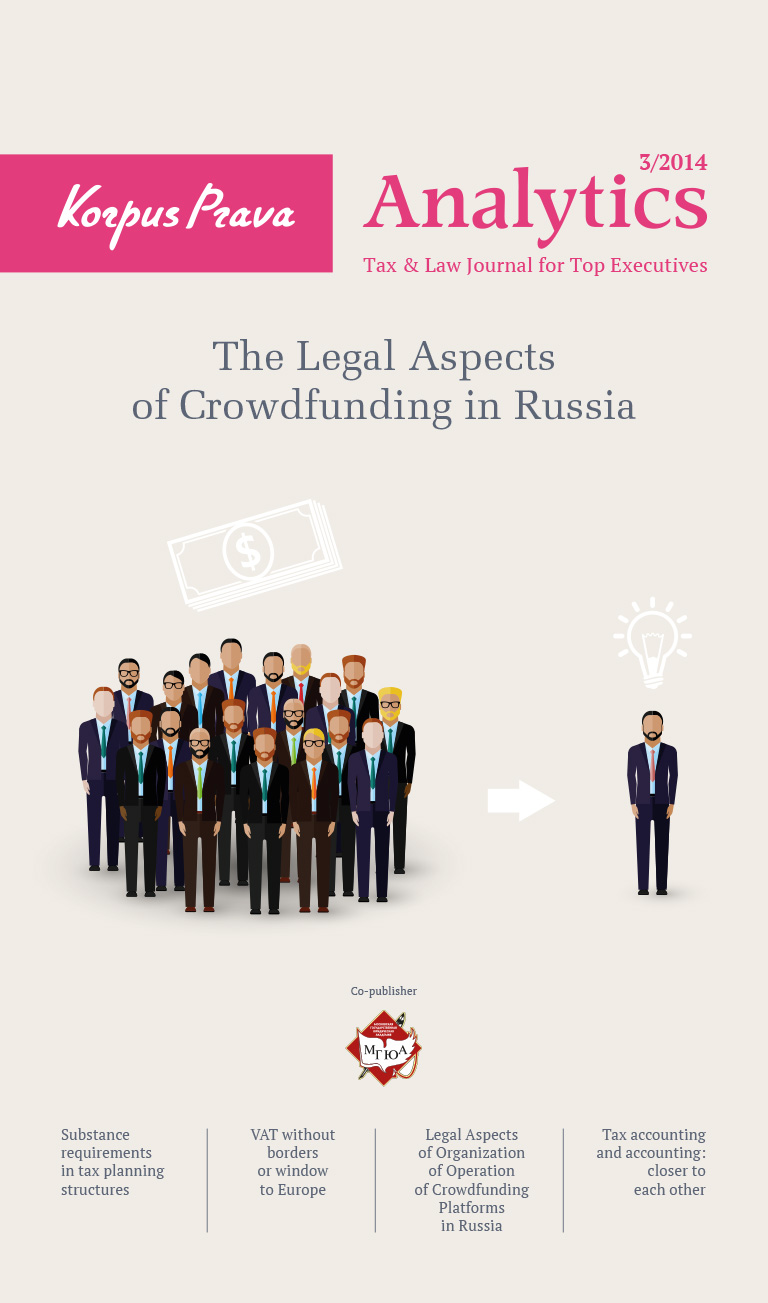- Cyprus Citizenship Scheme for Foreign Investors
- Squeezed But Pleased: Taxation of Passive Income in the European Union
- VAT Without Borders or Window to Europe
- Legal Aspects of Organization of Operation of Crowdfunding Platforms in Russia
- Substance Requirements in Tax Planning Structures
- “Deposit Splitting” of Individuals. Legal Civil and Criminal Aspects
Import Substitution: Problems and Prospects of International Isolation of the Russian Economy
Notorious events in the Crimea and in the southeast of Ukraine have caused major changes in European and American economic policy concerning the Russian business and, subsequently and promptly, reciprocal measures on the part of the Russian administration. Development of sanction and countersanction movement has been the main topic for discussion among politicians and housewives over 2014-2015. As for the real business, over the last two years it has been learning to exist and operate by trial and error in the circumstances concerned.
Sanctions against certain persons and organizations such as major Russian banks and state companies are just a tip of the iceberg. Private companies, producing and supplying military, dual-purpose products and other goods, which have been included into sanction lists of importing countries for some reason, have also faced difficulties.
There are cases when organizations, which activities are in no way related to producing military and technical products face prohibitive measures from foreign states. Thus, the reality is that western companies demand representation and warranties from their Russian partners that the latter do not sell or purchase goods, works and services in the Republic of Crimea. Some contractors refuse to sell certain goods to Russian buyers by freely interpreting international legal norms and internal legal acts of their countries. There are also situations when the representatives of foreign companies completely refrain from any contacts with their Russian partners.
In response to western sanctions and acting in accordance with the relevant Decree of the President1, the Government has imposed a ban on the import of certain types of agricultural products, raw materials and food whose countries of origin are the states supporting sanction policy towards Russia.
Comparison table of sanctions and countersanctions:

Despite the questionable legal status of both prohibitive measures of western countries (for instance, it is technically impossible to restrict the trade with the Republic of Crimea only by not restricting the trade with the Russian Federation2) and the Russian countersanctions, restoration of status quo should not be expected anytime soon. Apparently, we will have to adjust to a new reality, which may last for several years.
Import substitution is probably a term, which can be very often heard in connection with any mentioning of sanctions and countersanctions. However, the import substitution issue has been on the agenda of the Russian legislators and law enforcers for a long time. It became a subject of active discussion in the beginning of the 2010s but it has significantly developed only by now.
Imposing western sanctions may be considered the beginning of the new phase of interest towards the import substitution. Then the Russian rule-making has gone “from decree law to legislative regulation” and “from prompt political response to economic efficiency”. In this regard, two directions of legal regulation of import substitution have been singled out: first, imposing prohibitions and restrictions on the import of certain goods into Russia; second, state campaign to support domestic producers.
Imposing Prohibitions and Restrictions
As mentioned earlier, the first step was the Decree of the President of the Russian Federation On Applying Certain Special Economic Measures to Ensure the Safety of the Russian Federation. This document declares prohibitions and restrictions to foreign economic operations providing the import of certain types of agricultural products, raw materials and food, which country of origin is a state decided to impose economic sanctions towards the Russian legal entities and (or) natural persons or which acceded to this decision, into the Russian Federation3.
Pursuant to the Decree, the Government has approved the list of products prohibited for import into Russia4. It was initially assumed that the Resolution would be effective for one year but the analysts’ forecasts came true, it is currently assumed that it will be effective at least until August 05, 2016. In the course of extension of the Resolution, the list of goods prohibited for import has not changed.
By the middle of 2015, it became clear that the countersanctions would be extended for another year. At the same time, the Government has decided to tighten control over the implementation of imposed prohibitions and restrictions. The right to confiscate and to make a decision on destruction of “sanction” products has been granted to the following government authorities: the Federal Customs Service, the Federal Service for Supervision of Consumer Rights Protection and Human Welfare and the Federal Service for Veterinary and Phytosanitary Surveillance5.
In this regard, the powers of customs authorities are still controversial. It is known that since the accession of Russia to the Customs Union the very notion of the border of the Russian Federation for customs purposes has lost its meaning. During the export or import of goods only the fact of transfer (or prohibition of transfer) of goods across the customs border of the Customs Union may have a legal effect. Any prohibitions or restrictions to the transfer of goods across the customs border of the Union may be formally introduced only by the decision of the Customs Union Commission and shall apply to its entire territory but not to the territories of certain states. That notwithstanding, the authorities of the Federal Customs Service detain and destroy the goods imported in violation of the established prohibitions to the best of their abilities (and within the scope of their powers).
As for other bodies authorized by the Government, their activities are related to goods already released for free circulation in Russia. In other words, even the goods legally transferred across the customs border of the Customs Union may be confiscated and destroyed by one of the following authorities: the Federal Service for Supervision of Consumer Rights Protection and Human Welfare and the Federal Service for Veterinary and Phytosanitary Surveillance, if they detect the availability of “sanction” goods in public circulation in Russia.
The Government has stipulated the following terms of destruction of goods:
- The detected “sanction” goods must be destroyed immediately (after preparing the act of detection thereof);
- Decision on confiscation and destruction must be made by authorized officials, which detected not so much “sanction goods” as the “fact of effecting foreign economic operations stipulating the import of goods prohibited for import into the Russian Federation” (in other words, if the goods are available in stock and (or) in public circulation in Russia but the fact of the import thereof is not established (for instance, the forwarding documents and invoices specify that the country of origin is Russia) there are no grounds for confiscation and destruction thereof6).
As we can see, the prohibitions and restrictions to import and sales of “sanction” goods in Russia are of rather political and legal nature. Unfortunately, it is possible to speak of appealing the decisions on confiscation and destruction of such goods only in a part of appealing the labeling of certain commodity items as “sanction”.
Supporting Domestic Producers as a New Goal of Legislators
During the first year of the “Ukrainian crisis”, the Russian legislators did not pay any significant attention to the import substitution, having concentrated mainly on assertion of sovereignty of the Russian Federation. The first legal act concerning the import substitution was adopted in the very end of 2014, it was the Federal Law On Industrial Policy, which proclaimed the transition from raw materials export economy to innovation-driven economy, ensuring the defense capability and security of the state, and employment of population as the main objectives of industrial policy7.
Probably the most important innovation of the law in question is the legislative setting of priority of the Russian goods over foreign goods during public purchases8. It should be noted that the purchase of the Russian goods for state and municipal needs has become not a right but an obligation of state and municipal customers. This requirement shall also apply to purchase of goods by legal entities with state participation9. Other than that, despite an outright declarative nature of this law, it has become an important stage of lawmaking by having become a springboard for introducing amendments into the other, sectorial and special, legal acts.
Currently the state support (by which we also mean the support on behalf of major government-sponsored enterprises) is also given to the following industries:
- Aviation industry – the Ministry of Industry and Trade has developed the time-schedule of localization of production of such elements as fuselage glazing, AC/DC generation systems, auxiliary power units, flight deck lighting, flight deck oxygen systems and other components for SSJ aircrafts (total 10 items). Currently these components are 100% imported. Partial localization of the production of fuel systems, fire-protection systems, parts of airliner interior and other parts of aircraft (total 12 items);
- Automobile industry – mainly in the course of producing certain parts of KamAZ, Lada automobiles, particularly electrical equipment;
- Construction – in the course of development of engineering solutions and production engineering.
So far, we can only conjecture whether the beneficial effect of import substitution exceeds all difficulties, which the Russian business faced. Apparently, everyone will answer this question for themselves. We will not assume how many years or decades it will take to achieve all goals. Having survived multiple crises the Russian business got used to waiting.
- Decree of the President of the Russian Federation No. 560 dated 06.08.2014 On Applying Certain Special Economic Measures to Ensure the Safety of the Russian Federation.
- Article 8 of Constitution of the Russian Federation guarantees the integrity of economic space, a free flow of goods, services and financial resources. Considering the fact that the same Constitution incorporates the Republic of Crimea into the Russian Federation, no such restrictions will be effective for the Russian company.
- Article 1 of the Decree of the President of the Russian Federation No. 560 dated 06.08.2014 On Applying Certain Special Economic Measures to Ensure the Safety of the Russian Federation.
- Resolution of the Government of the Russian Federation No. 778 dated 07.08.2014 On Measures for Implementation of the Decree of the President of the Russian Federation No. 560 dated August 06, 2014 On Applying Certain Special Economic Measures to Ensure the Safety of the Russian Federation.
- Resolution of the Government of the Russian Federation No. 774 dated 31.07.2015 On Approval of the Rules for Destruction of Agricultural Products, Raw Materials and Food Included into the List of Agricultural Products, Raw Materials and Food Whose Countries of Origin Are the United States of America, the European Union Countries, Canada, Australia and the Kingdom of Norway and Which Are Prohibited for Import into the Russian Federation up to August 05, 2016 (and Including).
- Paragraph 2 of the Rules for Destruction of Agricultural Products, Raw Materials and Food Included into the List of Agricultural Products, Raw Materials and Food Whose Countries of Origin Are the United States of America, the European Union Countries, Canada, Australia and the Kingdom of Norway (and Including) and Which Are Prohibited for Import into the Russian Federation up to August 05, 2016 approved by the Resolution of the Government of the Russian Federation No. 774 dated 31.07.2015.
- Federal Law No 488-FZ dated 31.12.2014 On Industrial Policy in the Russian Federation.
- Article 18 of the Federal Law No. 488-FZ dated 31.12.2014 On Industrial Policy in the Russian Federation.
- Federal Law No. 223-FZ dated 18.07.2011 On Purchases of Goods, Works and Services by Certain Legal Entities.
Your subscription to our journal will definitely boost the efficiency of your specialists and downsize your expenses for consultants.
The journal is available free of charge in the electronic version.
Free Download

